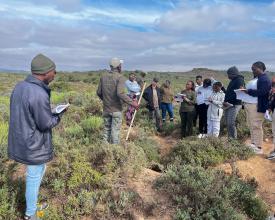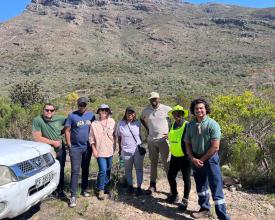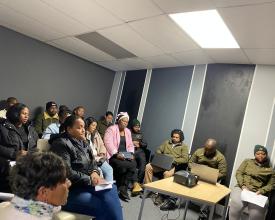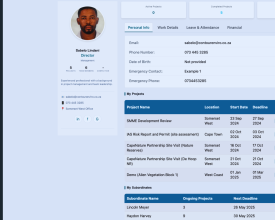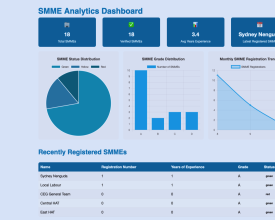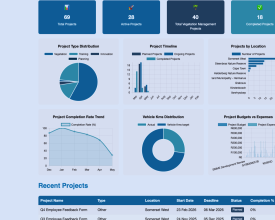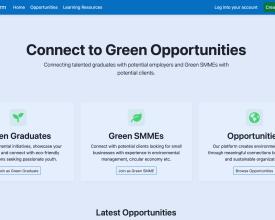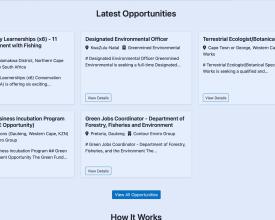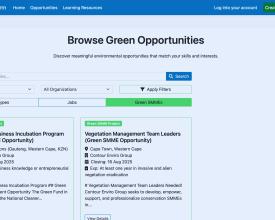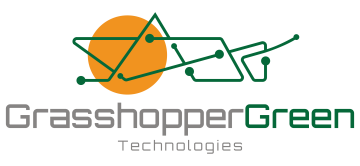
Grasshopper Project Management Tool for Invasive Species Management

In 1995, South Africa launched one of its most progressive job creation initiatives: the Working for Water programme. It focused on protecting ecosystems by removing invasive vegetation from mountain catchment areas while creating jobs and reducing poverty in vulnerable communities. The programme has since created thousands of jobs and supported families across diverse landscapes. However, a key challenge has been the limited transfer of business, finance, and technology skills to participants. The Grasshopper Tool—a web and mobile application—helps address this by enabling contractors to manage projects, field teams, tools, and equipment. It also allows them to generate quotes and invoices for ongoing and new work opportunities, reducing reliance on paper. Additionally, the tool is also meant to support conservation agencies in managing large teams and projects efficiently.
Tech4Nature Award
The technology is a software solution designed to simplify project management for contractors in the vegetation management sector, which is largely outsourced to MSMEs from disadvantaged communities. These contractors often have limited education and lack access to digital tools or accounting software, making contract and project management difficult. The Grasshopper Tool addresses this gap by offering an easy-to-use web and mobile platform. It features built-in machine learning that uses historical data to assist with accurate quoting for alien vegetation clearing. It also supports workflow tracking, progress monitoring, and performance analytics—highlighting how teams are performing in terms of person-days and costs.
Additionally, the tool allows users to generate invoices, manage assets, and operate more independently. It is also suitable for conservation agencies managing large teams and projects. Future updates will include mapping and time management features as well as measuring the ecological impact of their work which could be used to generate extra income for the participating MSMEs. Grasshopper is part of a broader Conservation MSME Development Programme led by Contour Enviro Group and supported by the Table Mountain Fund (WWF-SA), CATHSSETA and the Department of Forestry, Fisheries and the Environment, aimed at providing mentorship and digital support to MSMEs in invasive species management.
The solution was funded by Contour Enviro Group, however the MSME Development programme has been supported by the following organisations:
- The Table Mountain Fund (2022-2025)
- WWF-SA (2022-2023)
- CATHSSETA (2025)
- Department of Fisheries, Forestry and Environment
- Department of Small Business Development
Context
Challenges addressed
Environmental: Grasshopper supports invasive species management with a focus on efficient project delivery. A key issue it addresses is the inconsistency in quoting and estimating time needed to clear vegetation blocks, often leading to disputes between conservation staff and MSME contractors. The tool standardizes this process, improving planning and transparency.
Social: The Working for Water Programme aimed to uplift poor communities but fell short in developing MSMEs, many of which still rely on paper-based systems. Grasshopper provides these contractors with easy-to-use digital tools for managing projects, quotes, and invoices, promoting inclusion and capacity building.
Economic: Conservation organisations benefit from better oversight and operational intelligence, while MSMEs improve their business processes, competitiveness, and sustainability through streamlined workflows and access to real-time work opportunities.
Location
Process
Summary of the process
The success of the Solution is driven by three interconnected building blocks: (1) the Conservation MSME Development Programme, (2) inclusive work opportunity facilitation (3) building of new partnerships with conservation organisations (4) green platform for green opportunities and lastly the adoption by the MSMEs .
Training and mentoring alone would be ineffective without securing real contracts for MSMEs, and vice versa. Contour Enviro Group bridges this gap by equipping contractors with skills, then linking them to public and private sector projects. The green opportunities platform was intended and developed to facilitate and create a database for Green MSMEs and link them to available opportunities in the sector.
Grasshopper Technology strengthens this system by providing a digital backbone for MSMEs to manage these projects efficiently, reducing barriers to scale and long-term participation. The MSMEs receive a structured training and get onboarded onto the system. Thereafter once their profiles have been set-up they receive all the support through a dedicated team that help them navigate through the system and deal with all the challenges that they may be faced with.
Building Blocks
Conservation MSME Development Programme
As mentioned in the previous sections, this programme is meant to achieve the following: “to develop, empower, support and professionalize Conservation MSMEs in the conservation sector in South Africa”.
The programme has trained over 20 MSMEs and created over 400 jobs annually since 2022 based on this programme. This programme is the main building block for the Grasshopper Project Management Tool as it was realised that the MSMEs need some support and a consolidation of their project management efforts, access to basic financial tools such as quoting and invoicing. Furthermore, to manage their assets etc.
Enabling factors
The organisations that made the Programme successful have already been mentioned however they are listed below once again:
- The Nature Conservancy- South Africa
- The Table Mountain Fund
- WWF-South Africa
- Department of Fisheries, Forestry and Environment
- Department of Small Business Development
- Tourism and Conservation Sector Education and Training Authority
The focus of the programme is as follow:
- Mentorship and coaching
- Business support and development
- Business, finance, and Human Resources training
Lesson learned
- MSMEs need to manage their projects efficiently.
- The government partners already mentioned above need support to manage their alien vegetation teams and this solution will be a great tool to do so.
- Resource wastage
Inclusive Work Opportunity Facilitation
Contour Enviro Group further coordinate and create job opportunities for the MSMEs that have gone through the training programme so that they may practice their acquired skills. All of our MSMEs have acquired work since the inception of the programme and this has brought some sustainability on the model.
Enabling factors
The MSMEs work opportunities to date through Contour Enviro Group who coordinates work opportunities in the sector.
The organisations that made this building block possible include but not limited to the following:
- City of Cape Town
- Cape Winelands Fire Protection Association
- Kogelberg Biosphere Reserve
- Conservancies
Lesson learned
Once again, it was realised that their work is inundated with administrative work which they do mostly on books in field which often get lost. Thus the Grasshopper Project Management tool was developed in order to support them while they are working in field.
Strategic Partnerships for Scalable Impact
Contour Enviro Group has established partnerships with some key conservation authorities in the country which further include local and provincial Protected Areas, where Contour gains access to conservation sites for its training programmes and exposing the MSMEs to conservation projects. Further discussions with other PA management authorities outside the Western Cape province are being discussed.
Enabling factors
This provides the facilities that Contour Enviro Group and Grasshopper does not have by using the following conservation areas for training purposes: Helderberg Nature Reserve, and 3x Protected Areas under the management of a provincial conservation authority.
- CapeNature (provincial conservation authority)
- City of Cape Town (local conservation authority)
- Department of Forestry, Fisheries and the Environment (national authority)
- Department of Business Development
Lesson learned
The conservation staff from these sites do provide access for training as well as the sites for practical purposes for the participants.
Grasshopper Digital Tool for Conservation MSMEs
A mobile- and web-based project management platform designed specifically for small contractors working in conservation. It enables users to manage teams, track fieldwork, generate quotes and invoices, and monitor project performance. The tool is optimized for low digital literacy, offline functionality, and smartphone accessibility—empowering MSMEs to operate professionally and independently in the conservation sector.
- Quoting tool: this has not been integrated yet to Grasshopper, however a prototype has been developed which uses historical data based on projects cleared in the past with similar characteristics e.g. a vegetation block/unit with Acacia mearnsii on a mountain slope with a 100% density and adult trees. This information will therefore guide the MSME based on thousands of datapoints collected from historical data. It does not provide a price for the MSMEs as these are affected by inflation government price adjustments etc. However it provides some guidance in terms of the number of days that each clearing block will take to remove of all the vegetation. The person days would normally be the driving force behind the actual quote or price of the site taking into consideration some key variables that include site location, transport, team composition and vegetation densities etc.
Enabling factors
The MSMEs must have acquired projects on their own or through the MSME Development programme. However the conservation organisations could also through the partnership further create these opportunities for the MSMEs. The conservation institutions especially the government will benefit greatly from such a Solution as they will be able to achieve some of their obligations for MSME development in the country therefore creating employment and reducing the countries unemployment of close to 40%. The best scenario is to have the government adopting this platform for their own MSMEs who are located across the country and in need of such tools, it must however be noted that the budget cuts especially for conservaiton programmes have affected the sector greatly and the government does not have the funding to support its MSMEs for digital access.
Lesson learned
The conservation organisations who are responsible for the environment and MSME development have no budget available for such initiatives.
Resources
Green Platform for Green Opportunities
Grasshopper Technologies has further identified a lack of coordination in terms of where Green Jobs are posted in South Africa. The Green Jobs Connect Platform was therefore built to help Green Graduates as well as Green SMMEs to apply for opportunities within the conservation sector in the country. The platform is made up of the 3 main components:
- Green MSMEs looking for opportunities
- Clients looking at appointing Green and vetted MSMEs and Graduates
- Graduates looking for work opportunities
The platform is managed by Grasshopper and is free for all and it seek to connect the three components above.
Enabling factors
This helps coordinate green opportunities in the sector.
Lesson learned
This Solution was recently launched therefore not a lot of lessons learned yet.
Resources
Grasshopper adoption among MSMEs
Currently, most MSMEs are sponsored by CATHSSETA as part of a structured developmental programme. The basic version of the Grasshopper Tool is priced at $43.70 USD (approximately R800) per month, allowing each MSME to onboard up to 10 users and manage up to 50 projects. Although the tool has not yet been actively marketed, it has already attracted interest, with several self-funded MSMEs requesting access and successfully onboarded.
While the tool is not yet available on app stores, it is fully accessible via web browsers on both smartphones and computers, which all participating MSMEs currently use.
Enabling factors
Adoption of the Grasshopper Tool is largely dependent on MSMEs having consistent work opportunities within the conservation sector. Sustainable adoption is closely linked to MSMEs being trained not only in technical fieldwork but also as capable business owners. To support this, the Green Jobs Connect Platform was established to consolidate and facilitate access to available opportunities across the sector. Additionally, partnerships with relevant conservation organisations and stakeholders play a crucial role in securing funding that enables MSMEs to participate in the broader MSME Development Programme.
Lesson learned
The basic monthly subscription for the Grasshopper Tool is R800 (South African Rand), which is generally affordable for MSMEs. However, affordability can become a challenge during periods when work opportunities are limited. This is why strategic partnerships and the integration of other building blocks—such as mentorship, work facilitation, and institutional support—are essential to the success and sustainability of the intervention.
While a few MSMEs are self-funded and have opted for customizable premium packages, the capacity and maturity of MSMEs vary significantly. Some contractors, particularly those over the age of 50, face challenges due to lower literacy levels, as many were not able to complete secondary education. In contrast, younger "Green MSMEs" often possess matric or post-matric qualifications and are able to navigate the tool with ease.
For MSMEs with limited education, support is provided to help them input basic data into the system. As part of their development, they are encouraged to rely on younger supervisors or team leaders—who are typically more digitally literate—to assist with using the platform effectively.
Impacts
Grasshopper was developed through the Conservation MSME Development Programme, launched in 2022 with support from the Table Mountain Fund. The initial pilot included four female-led MSMEs, creating over 300 job opportunities from 2022 to 2024 and significantly increasing business income. During mentorship, the need for a scalable, user-friendly project management tool became clear—leading to the creation of Grasshopper.
The project has since expanded to 10 more MSMEs through a partnership with a national Sector Education and Training Authority (SETA), with a focus on digital capacity-building. Grasshopper improves efficiency, quoting accuracy, and financial independence, enabling MSMEs to participate more competitively in the conservation economy.
The tool supports GBF Target 1 by improving spatial planning and tracking of invasive species removal, and GBF Target 2 by directly enabling ecosystem restoration. It also advances GBF Target 20 by providing MSMEs with practical digital tools and training.
Grasshopper contributes to key SDGs, including SDG 1 through job creation and income growth, SDG 8 by promoting decent work and skills development, and SDG 15 through ecosystem and biodiversity restoration.
Environmental: Improved ecosystem health through invasive species control.
Social: Job creation and MSME empowerment.
Economic: Increased income stability and operational efficiency.
Beneficiaries
To date only 10 MSMEs have benefited from the solution. Each MSME employs a minimum of 12 employees and currently over 380 people are employed and their projects are managed through the Solution.
75% of our MSMEs are women who come from poor communities.
Additionally, explain the scalability potential of your Solution. Can it be replicated or expanded to other regions or ecosystem?
Although currently implemented in the Western Cape, the Solution is highly scalable. South Africa has over 10,000 MSMEs engaged in vegetation management, with billions spent annually by government and NGOs on land restoration. Grasshopper’s flexible, modular design allows it to be adapted for various conservation activities (e.g., soil erosion, reforestation, wildlife monitoring). With strategic partnerships—especially with national conservation authorities like the Department of Forestry, Fisheries, and the Environment—the tool can be rolled out nationally and across Southern and East Africa. It is envisaged that by the end of 2025, 80 more MSMEs will be added in partnership with CATHS-SETA (Culture, Arts, Tourism, Hospitality, Sport, Sector Education and Training Authority).
An interest has been expressed by some conservationists in Sierra Leone and the potential partners are testing the suitability of the Solution and further assessing how it could be adapted for local projects.
Global Biodiversity Framework (GBF)
Sustainable Development Goals
Story

My story begins in the small coastal town of Port Alfred, South Africa, where I was born into a poor family. I became the first in my family to attend university, thanks to a scholarship that allowed me to study Nature Conservation. This opportunity changed the course of my life and gave me a deep appreciation for the environment—and the challenges faced by those tasked with protecting it.
After graduating, I worked for leading conservation agencies such as South African National Parks and CapeNature, eventually becoming a Conservation Manager. Over 15 years, I managed large-scale programmes, including Working for Water, which tackles invasive alien vegetation. During this time, I saw how small businesses (MSMEs) from poor communities were involved in fieldwork, yet remained trapped in poverty. Despite participating in public job creation programmes, these contractors lacked the training and tools to grow sustainable businesses. They are dependent on government projects, lacked access to digital systems, and struggled with project management, quoting, and invoicing.
In 2017, I founded Contour Enviro Group to change this reality. One of our goals was to support the professional development of MSMEs in conservation. In 2021, we were appointed by the Agulhas Biodiversity Initiative—a coalition of over 20 conservation organisations—to assess a decade-long alien clearing programme. Our findings confirmed my long-standing concern: while jobs were being created, long-term MSME development was missing.
I incorporated these lessons into my business master’s research and approached the Table Mountain Fund (WWF-South Africa) for support. With their help, we launched a pilot Conservation MSME Development Programme in 2022, focusing on four women-led contractors. We provided them with mentorship, training, and work opportunities. The results were transformative: over 300 jobs were created, incomes improved, and the contractors gained confidence and independence.
However, administrative inefficiencies persisted. Many contractors still relied on paper-based systems, leading to delays, poor planning, and missed opportunities. That inspired the creation of the Grasshopper Tool—a mobile and web-based project management system designed specifically for conservation MSMEs. With Grasshopper, they can manage their teams, projects, equipment, quotes, and invoices in one place. It empowers them to operate professionally, grow sustainably, and become active agents in ecosystem restoration.




